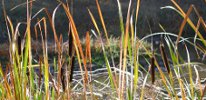
Training
Control of Blue Gum Eucalyptus in Coastal California
COST: FREE
REGISTRATION FOR THIS PROGRAM IS CLOSED
Instructor Information
Tom Elliot
Restoration Coordinator
Site Stewardship Program, Golden Gate National Recreation Area
Sue Gardner
Golden Gate National Parks Conservancy
Ken Moore
Wildlands Restoration Team
Don Seawater
Pacific Coast Lumber, San Luis Obispo
Contact
Grey Hayes
grey@elkhornslough.org
(831) 274-8700
Sponsors
Description
See also: Blue Gum Eucalyptus, Maintaining Biodiversity
Blue gum eucalyptus trees (Eucalyptus globulus) are big, charismatic, incendiary trees, loved, hated, and feared by Californians. During our first workshop, in 2004, we heard that stands of blue gum have clear impacts to native biota in some cases but provide important habitat in other cases. This workshop proceeded from the assumption that managers understand the level of rigorous review that blue gum removal projects require. Blue gum stands may be especially valuable where they are close to bodies of water, in urban or other built environments, or close to the ocean where temperatures may support over-wintering Monarch butterflies. In many cases, after appropriate biological review, science supports blue gum stand thinning or removal and restoration to a native plant community. How can this be accomplished? This workshop provided insight into the social, technical, and economic considerations of blue gum eucalyptus control for ecological restoration. During the workshop, a line-up of engaging presenters shared their expertise in all stages of a blue gum eucalyptus removal project: * planning the project and building public support; * techniques for felling or otherwise killing eucalyptus trees; * wood disposal options, from chipping for mulch, to proper drying for value-added products like flooring; * re-planting and monitoring for the recovery of native plant communities. After lunch, we heard several case studies in blue gum eucalyptus removal. These case studies presented information on how many trees were removed; where; how; what resources were required; barriers to implementing the project (overcome or not); how was wood disposed of; replanting; and the results to the site. Following the case studies, we traveled a short distance by bus for a field trip to the nearby Elkhorn Slough Reserve. There, we walked through a restored oak woodland where eucalyptus was removed nearly ten years ago. We also observed a demonstration of the drill-and-inject treatment on large blue gum eucalyptus trees.
Documents and Publications
| DOCUMENT | AUTHOR / SOURCE |
|---|---|
| WORKSHOP MATERIALS | |
| Agenda: Control of Blue Gum Eucalyptus in Coastal California PDF, 55KB |
|
| Case Study: Eucalyptus Control at the Tam Fire, June 2004 PDF, 407KB |
Daniel Boughter |
| Case Study: San Mateo County Parks Project PDF, 237KB |
Richard Trejo |
| Case Study: UC Berkeley Wildfire Mitigation Program PDF, 623KB |
Tom Klatt |
| Case Study: WUI (Wildland-Urban Interface) Risk Reduction Project PDF, 380KB |
Ron Prince |
| Presentation: Alternatives to the Landfill for Blue Gum Wood Disposal: Options for Value0Added Products to Lower-Value Uses PDF, 436KB |
Don Seawater |
| Presentation: Confronting the Giant: Control Techniques for Blue Gum Eucalyptus in Wildlands PDF, 2.4MB |
Ken Moore |
| Presentation: How to Build Public Support for Eucalyptus Control Efforts PDF, 562KB |
Sue Gardner |
| Presentation: Introduction and Review of June 2004 Workshop PDF, 1.2MB |
Grey Hayes |
Questions and Answers
Submit a question on this subject and we'll provide an answer. coastaltraining@elkhornsloughctp.org
